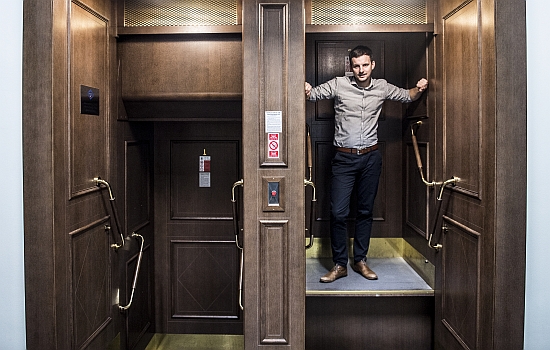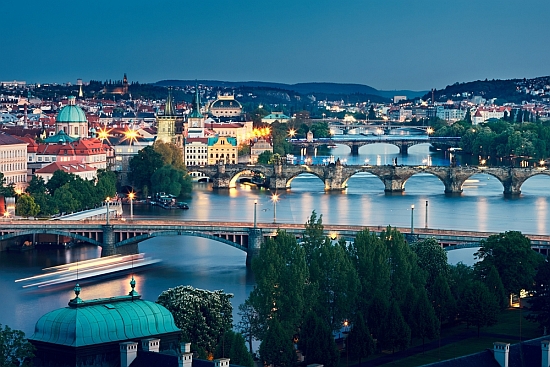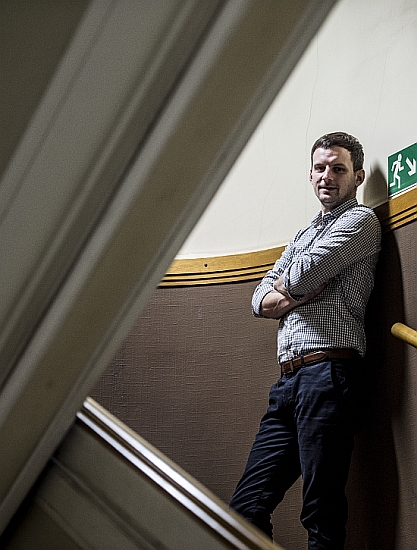Prague's Night Mayor Jan Štern
By Jan Velinger
February 27, 2019
More and more cities around the world are introducing a job at city hall known as the Night Mayor – an official tasked with cultivating nightlife while lessening negatives such as noise, vandalism, or generally rowdy behaviour disturbing residents’ lives and sleep.
Prague’s recently appointed night mayor is Jan Štern – a self-described night owl as well as alumni of Charles University’s Faculty of Arts (with a Masters in Aesthetics) who explains that the key to success will be to bring people together to find solutions.

Going up in the world: Prague's nightlife mayor Jan Štern. Photo: Vladimir Šigut.
We discussed everything from nightlife in London to existing clubs in Prague, but I began our interview by asking Jan Štern where and when it was that the idea of a nightlife mayor first took off.
“It has been some eight years before they adopted the idea in Amsterdam and some cities in the Netherlands introduced the position of night mayor even earlier. But we are seeing a kind of wave of new night or nightlife mayors now perhaps because of the results that Amsterdam achieved. Other cities have learned it can be a good tool to tackle problems with tourism and nightlife.”
What were some of the issues Amsterdam faced given this is a city that is relatively famous for its nightlife? And how different or similar are conditions there to those in Prague?
“They are different but also very similar in many regards, not least in their tourist structure that visit both cities, the activities they look forward to and the party atmosphere they want to enjoy. Both cities have a high number of tourists – Prague is the seventh-most visited city in Europe and the historic city centre is of course ‘hard hit’.
“So the reason the new administration backed the idea of having a new night mayor is because Prague is an ideal candidate, having a robust nightlife, a city centre that is becoming a deserted zone with fewer and fewer residents and conditions which are hard to live in. These are some of the problems that we face.”
As far as rules and regulations are concerned, it should for example be quiet in residential areas, after 10 pm… So noise – that is one of the big ones…
“Let me respond with something different first. I want to highlight that the night mayor is not a person who exists to strangle the city’s nightlife, quite the opposite. He or she are not in the job to restrict nightlife and for a night mayor, nightlife should be the most important thing.
“This is the main focus of the job and the night mayor should want it to flourish and so on. Of course, there is no denying that each city’s nightlife comes with its own set of problems. And if these are not squarely addressed, the outcome will be that the nightlife will suffer consequences as a result.”
If you have the possibility of repressive measures it can happen that a nightclub where there are repeated disturbances, locals will get fed up, put pressure on their local politicians and the result will be that the club will be shut down…
“That is exactly what I am talking about and that is what happened in London. London is my favourite example because it perfectly outlines the dangers we face – if we fail to deal with nightlife problems. Around two years ago they did a study there which showed that over the last 10 years the city lost 40 percent of former clubs, traditional nightclubs where for example The Beatles used to play, shut down. That’s a huge problem.
“Nightlife is an important part of life in any city, especially for young people. If you want to attract young people to visit, work or live in London, you need to have a vibrant nightlife. And theirs was dying. The reason is that there were problems that went unaddressed for a long time, and anger among residents – which is completely understandable – grew and grew until the pressure on representatives to close down venues was greater and greater. So that led London Mayor Kahn two years ago to introduce the city’s own Night Tsar (Amy Lamé). It’s the same job with a slightly different name.
“The situation in Prague is totally different but nonetheless the outcome could be similar if we don’t face problems head on. I see my role as saving nightlife here from such a destiny.”
I have been in Prague long enough to remember Bunkr - a legendary or even infamous club long since closed. That doesn’t exist anymore but was a focal point (and source of ire for residents) for a long time… Today similar attention has shifted to Dlouhá Street in the city centre.
“Yes, if we talk about Dlouhá Street it has definitely become a symbol of ‘everything that is wrong’ with Prague nightlife, especially when it comes to tourism. There are a lot of clubs and bars and beer bike rentals…”
More rowdy stuff…
“Yes and everyone who comes to Prague to party heads over there and it is out of control just now. One of the things that we are thinking about when it comes to Dlouhá, where we see room for improvement, is to involve clubs themselves. We need them to realise that the flipside is much stricter regulations that would force them to close or to have early hours. The way to avoid such an outcome is to not to be part of the problem but part of the solution.”
Are there examples where this is already working, where clubs have taken their own initiative?
“Sure, exactly. This is something we did not invent of course: there are many pubs and clubs that do this. Offhand, I could name two venues in Prague that do this well, Cobra at Letná and Mlejnská (to be clear, I am not affiliated with either, they are just good examples): these are bars that have their own security guy outside. They are very decent guys who are very reasonable but strict and able to communicate and it works.”

Source: Shutterstock / Artist: Jaromír Chalabala
You have to be a good in psychology and know how to defuse situations… what about their physical presence, is that important?
“Not as much as you might think. This one guy is maybe 1 metre 60 or 70 and thin but what he has, is a way with people. He knows how to talk with people. It is not about threatening or being threatening. When I talked about the role of these guys in a previous interview, some people commented on facebook they didn’t want some two metre tall ‘neo Nazi’ standing there or beating someone up. But that’s not how it is at all. These are people who know how to communicate.”
In my ideal universe, I want clubs or venues to look at more than the bottom line and more than just one or two years ahead but to take pride in their surroundings as a part of the local community, not unlike a local theatre or a restaurant.
“There are venues that have that attitude and above all try and communicate. That talk with locals and nearby residents, maybe they even offer neighbours some kind of a discount. With a good attitude and openness and communication, I don’t think it is an exaggeration to say you can solve 90 percent of problems; having a good attitude is the difference.”
As night mayor, how do you measure success?
“The most important metric for me is that we talk with people – we are a service for the residents. We are here to find a balance between nightlife and day-to-day life. I will know I have succeeded if some locals in the more hard-hit tourist areas such as Dlouhá say so. If I hear that the situation has improved. Within two or three years I would be happy if most people knew about the night mayor and the job and measures which will hopefully have been successfully implemented and really work. That they will understand what the job entails and that we have taken appropriate steps for Prague.”
Speaking of the job, it is true that the title of night mayor is catchy. I heard some funny stories about people making fun or not knowing what the job entails, asking if you worked at night or run around the city like Batman.
“The name is catchy and provocative and that is why we went with it just like almost everywhere else. It gets media and public attention, which is desired. The flipside is that sometimes you have to explain that no, you don’t work at night or aren’t on the street at 2 am in front of a club hushing people to quiet down. You are a mediator – you are coordinating communication and driving cooperation with different parties from local residents to club owners to tourists and the police. You are in the middle of the fray and brining all sides together during the day. Not in the middle of the night.”
That said, it strikes me as a younger person’s job…
“Possibly, I am 35, it might be true. What can I say (laughs). I consider myself still young but in my best years for this kind of work! You have to love nightlife, you have to know people, they have to know you, you need to be a night person.

Night Mayor Jan Štern at City Hall. Photo: Vladimir Šigut.
“And the core of the message is to people to not be jerks. To this end, we are placing a lot of emphasis on an app being developed to communicate with visitors the moment they arrive. This app should make them feel at home and feel that they have a stake in the city and to realise its more than a flat backdrop for their good time.”
We have been taping this interview, phonetically, the title night mayor, said quickly sounds exactly like nightmare…
“Honestly, you are the first person to have pointed that out. But I like it – hopefully within two or three years I will be able to point to my work as night mayor and not that the job became a nightmare (laughs).”

